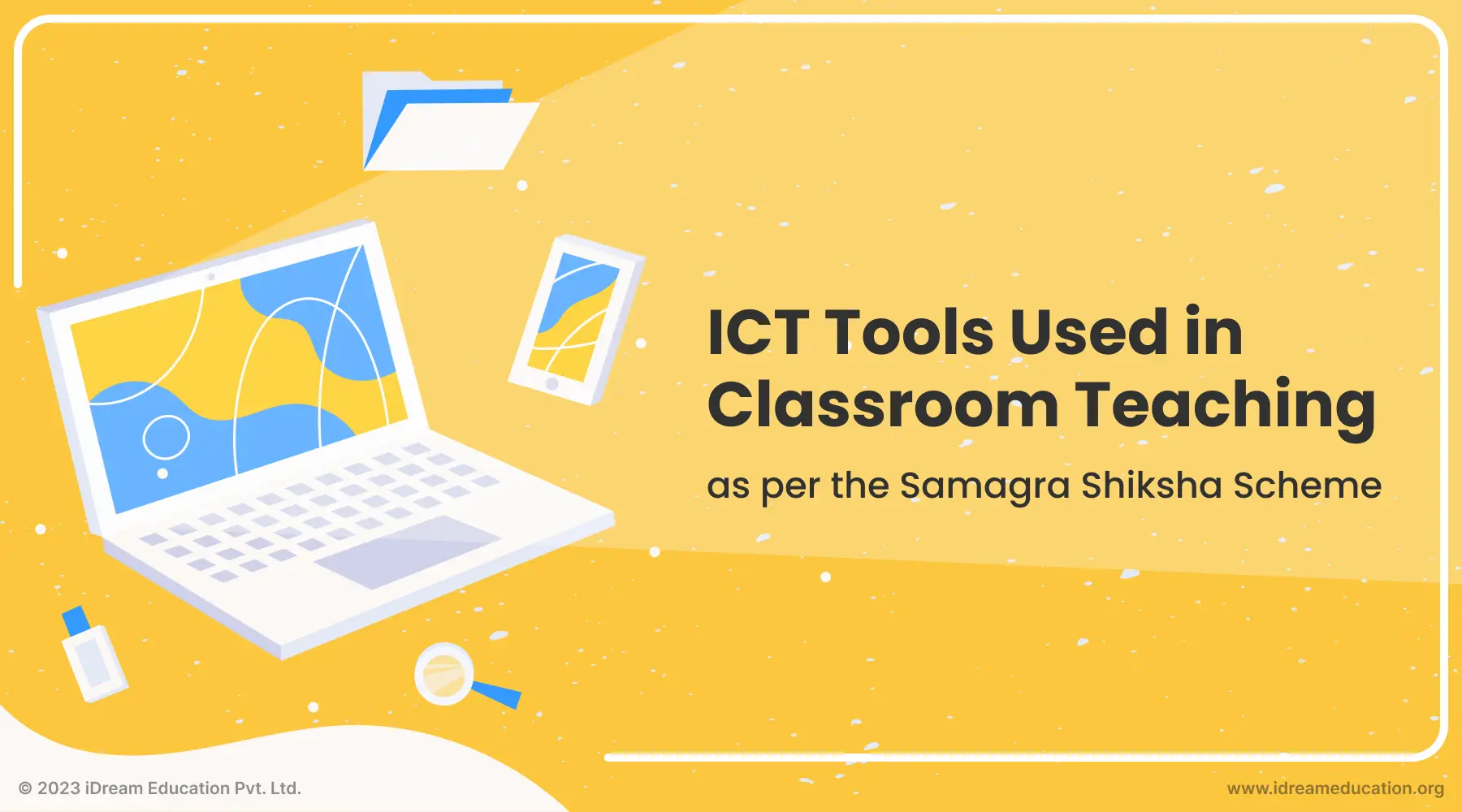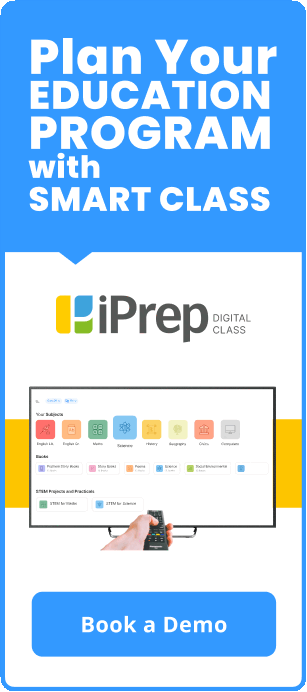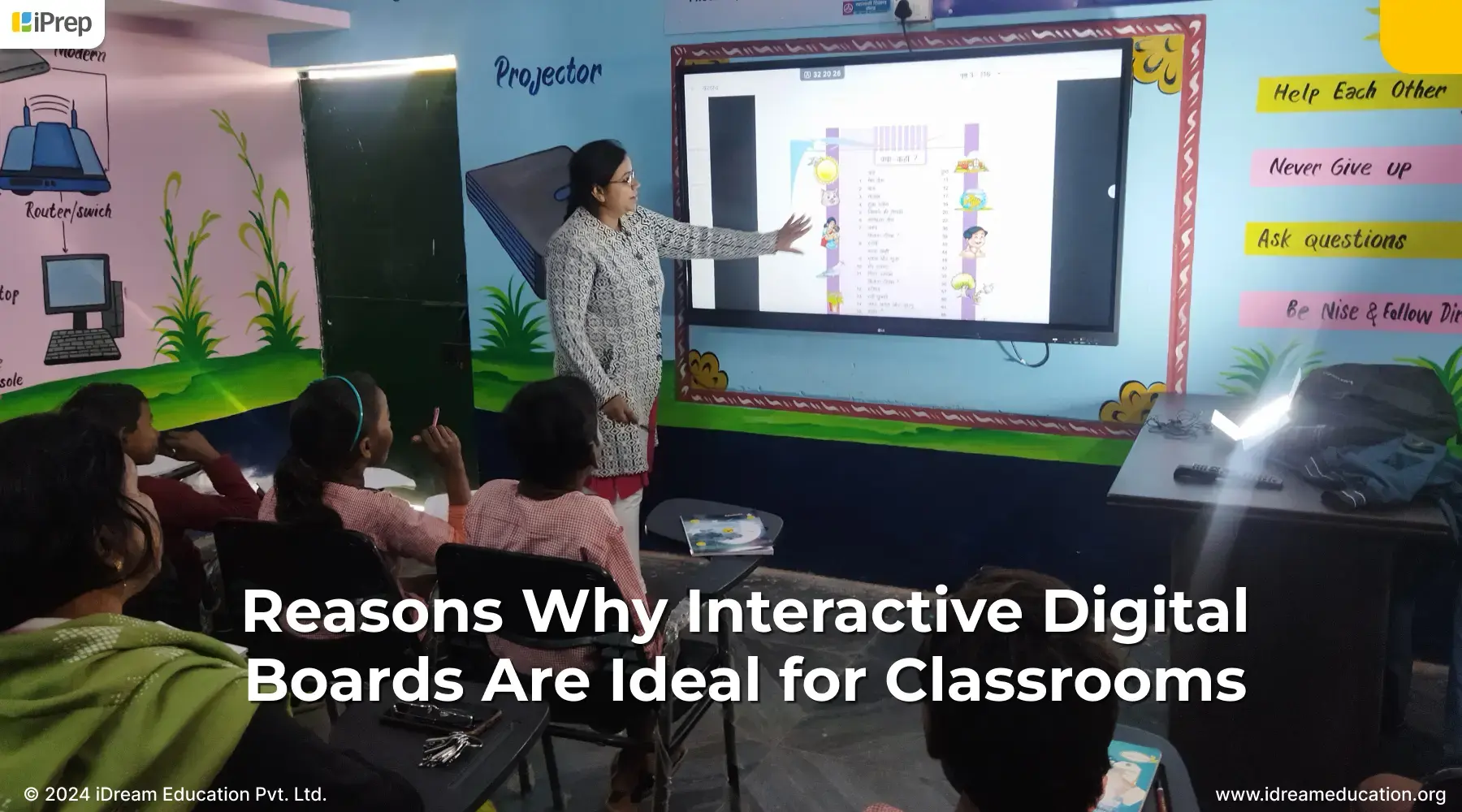The Intersection of Digital Education and ESG: Building a Sustainable and Inclusive Future
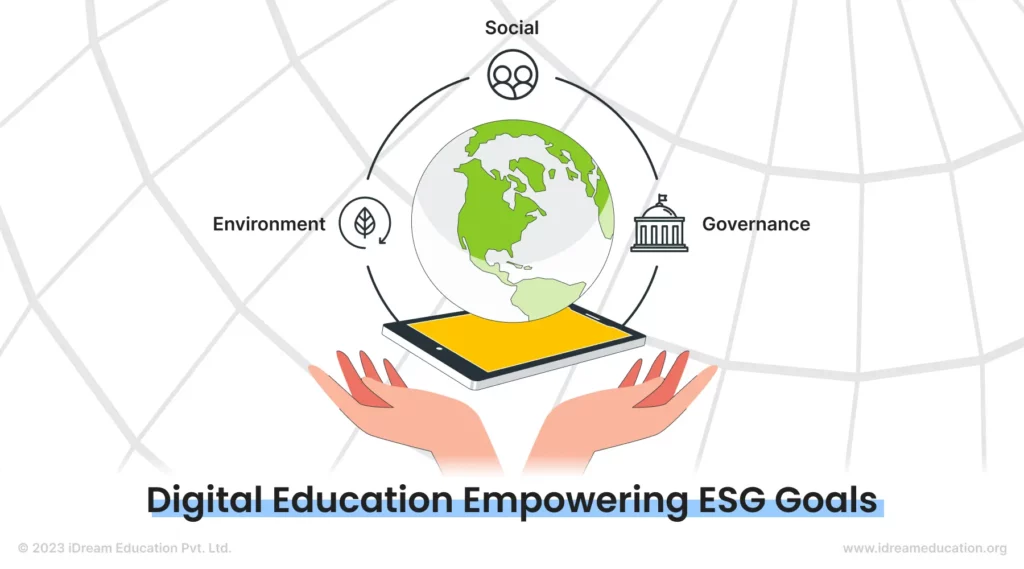
At the crossroads of business and social equity, there is a growing recognition that a sustainable approach is crucial for managing both the environment and the economy without compromising one for the other. Within this complex landscape, education, especially digital learning, emerges as a beacon of hope. The intersection of Digital Education and ESG can become a transformative force towards the creation of a more equitable world.
ESG and Education
Access to mobile phones, broadband, and online learning has ushered in a new era of information sharing and market expansion. This has necessitated heightened digital skills among the populace: be it the workforce or students. Despite these advancements, the digital divide persists, particularly in relatively less developed nations. The global learning crisis and talent gap, exacerbated by the COVID-19 pandemic, underscore the urgency of investing in education to address social inequality and economic instability. Placing education at the forefront of economic and business strategies proves impactful in achieving financial goals and enhancing Environmental, Social, and Governance (ESG) performance.
Encouragingly, there is a rising acknowledgement of the significance of Environmental, Social, and Governance (ESG) considerations in education. This recognition underscores the pivotal role played by schools and universities in promoting sustainability and equity. Ongoing initiatives include endeavours to reduce carbon footprints, renewable energy investments, and integration of sustainability into the curriculum. Decision-makers are increasingly prioritizing issues such as equal access to education, diversity and inclusion, and cultivating a secure learning environment.
Digital Education: A Catalyst for Social Inclusion and Economic Growth
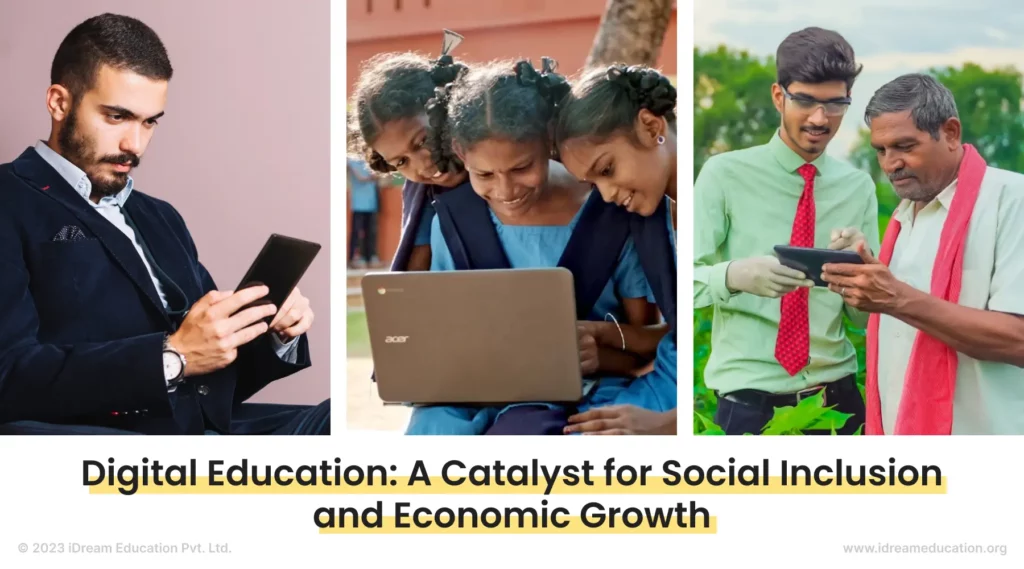
Recent research has investigated the potential impact of education and Information and Communication Technology (ICT) on the environment. One such study in East and South Africa shows the significance of Ed Tech in mitigating carbon emissions in these countries. The study offers valuable insights for climate policy planning and regional development. The findings showed that improved connectivity through broader ICT coverage can reduce carbon emissions by facilitating access to resources, knowledge and carbon monitoring. Moreover, environmental education through digital learning across all education levels was found to positively influence people’s attitudes towards the environment. The study highlighted the importance of policymakers endorsing sustainable values and allocating resources to Ed Tech to enhance environmental resilience.
Digital education emerges as a powerful catalyst in paving the way for not only environmental change but also societal progress. The integration of non-connected individuals into the digital realm presents an opportunity to create an ecosystem that fully leverages the potential of digital advancements.
In this context, companies and governing bodies play a crucial role in guiding communities by driving educational programs in low-income and rural areas. Through this, a dual objective is achieved. Not only does it foster digital inclusion in education, but it also initiates a ripple effect that contributes to the well-being of society at large. The interconnection between enhanced connectivity, digital access, and economic opportunities underscores the profound impact of digital education on societal advancement and sustainable practices.
Digital education, through online learning, collaborative initiatives, skill development, and awareness campaigns, has the potential to establish enduring structures. These structures serve as robust, long-term solutions for fostering an equitable, just, environmentally friendly, and forward-looking socio-economic framework.
Learning with Ed Tech Apps: Replacing Physical Trainings and Certification
Ed tech apps have revolutionized traditional learning methodologies by providing accessible and flexible platforms for skill development and certification. Replacing physical training programs with digital counterparts contributes to environmental sustainability by minimizing the carbon footprint associated with traditional in-person training. Digital learning also supports social inclusivity, providing individuals from diverse backgrounds with equal access to educational resources.
Making Community Engagement Digital
Digital education extends beyond individual learning to encompass community engagement. Online forums, webinars, and collaborative projects are crucial in forming knowledge communities without borders. These also help raise awareness about issues such as social responsibility, and ethical governance. Such initiatives promote transparency in community interactions and emphasize the importance of inclusive and participatory decision-making processes.
An excellent example is the Smart Agri project, Jan 2020, a CSR initiative by Vodafone-Idea Foundation and Indus Towers. Part of this project, the Smart Agri Hub, aimed at revolutionizing agriculture through the integration of technology, data analytics, and sustainable practices. Under this scheme, devices were utilised to gather real-time data on soil conditions, weather, and crop health. This empowered farmers to make informed decisions for optimal planting times, irrigation, and crop protection. The Smart Agri Hub benefited farmers, agri-entrepreneurs, and agri-extension workers creating a digital community for sustainable agricultural practices
Skilling and Development
Digital education functions as a potent instrument for skill development, providing a scalable and effective means of knowledge dissemination. Embedding modules related to environmental conservation, social responsibility, and ethical governance within digital skilling programs enhances awareness of sustainable behaviours. Learners apart from acquiring academic and professional skills, also understand the impact of their actions on environment and society. Sustainability awareness through digital education aligns with the overarching objective of nurturing socially responsible and environmentally conscious individuals.
Ensuring Sustainable Programs
One of the unique advantages of digital education is the ability to create sustainable programs that can operate on autopilot. This means that once developed, digital courses, training modules, and awareness campaigns can be sustainable, requiring minimal ongoing resources. These ensure consistent and widespread access to educational resources, promoting inclusivity.
A Common Minimum Approach
To achieve scalable impac, it is crucial to combine Digital Learning and ESG under a shared foundational approach. While ESG inherently focuses on sustainability, it is also important to include elements of scalability and governance into ESG programs. There is a need for establishing a standardized framework for ESG, encompassing essential components such as basic digital literacy, access to digital devices, minimum skills and certifications for students across different grades and stages of youth, incorporating sustainability chapters in every ESG program, setting minimum standards for climate action and sustainability, and defining access and standards for digital learning in regions of ESG implementation.
Some Notable Initiatives
It is crucial to acknowledge that the incorporation of ESG principles into CSR initiatives is an evolving practice. Organizations are progressively realizing the importance of aligning their endeavours with ESG objectives. Nonetheless, certain inspiring programs and initiatives have made the intersection of Digital Education and ESG goals a reality.
Digital Villages initiative
In the realm of rural development, ICICI Bank’s Digital Villages initiative exemplifies a commitment to realizing the vision of a Digital India. Building on the success of Akodara, India’s inaugural cashless village, the bank swiftly transformed 100 villages into ICICI Digital Villages within 100 days. This initiative, encompassing digital transactions, vocational training, and easy loans, takes a holistic approach to rural development, empowering villagers and fostering sustainable livelihoods through CSR.
TechSaksham
Microsoft India and SAP collaborate on TechSaksham, an initiative aimed at narrowing the gender gap in technology. TechSaksham focuses on equipping aspiring women engineers with relevant technological skills for future employment opportunities. The initiative offers courses in web designing, digital marketing, cloud computing, and artificial intelligence. It is specifically targeted at women students in government and government-aided colleges.
Samsung Smart School
Samsung’s global citizenship program introduces the Samsung Smart School to Jawahar Navodaya Vidyalaya (JNV) schools across India. This CSR initiative aims to provide less-privileged students with access to digital education and innovative technologies. Piloted in 10 JNV schools located in remote rural areas, each Samsung Smart School features smart classrooms equipped with advanced digital infrastructure, including interactive boards, tablets, and other amenities. The program focuses on interactive teaching methods to enhance students’ learning abilities and critical understanding.
iPrep Digital classrooms: S M Sehgal Foundation
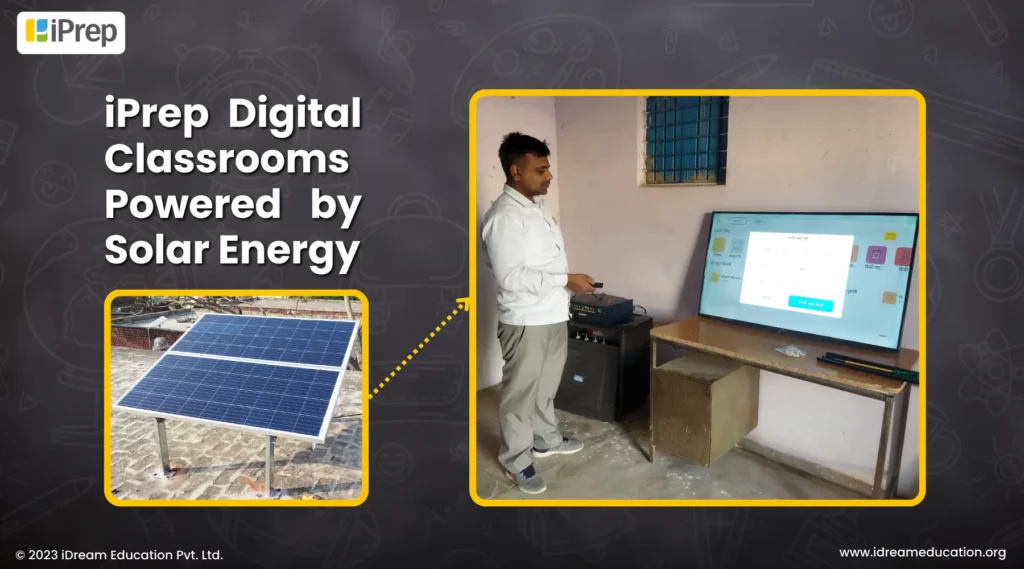
A noteworthy instance of the intersection of Environmental, Social, and Governance (ESG) and digital education is exemplified by the S M Sehgal Foundation’s project at the GMS school in Panchnota, South Haryana. Situated in an area with limited educational resources, this school posed significant challenges to delivering quality education and achieving positive learning outcomes. To address these challenges, the S M Sehgal Foundation, a developmental initiatives entity, introduced smart classes embedded with the innovative iPrep learning platform.
iPrep has transformed the learning experience, making it accessible, enjoyable, and engaging, particularly for learners facing obstacles in remote areas. This initiative has markedly streamlined the teaching-learning process, improving students’ comprehension of concepts and fostering meaningful learning. Notably, the smart classes operate on solar energy, marking a pivotal stride toward integrating sustainability principles into the realm of digital education.
iPrep Mobile App: Bharat EdTech Initiatives & Milaan Foundation
Some time back iDream Education provided iPrep, its K-12 learning app, to school students in 52 districts under the Bharat EdTech Initiatives, along with Milaan Foundation. A unique aspect of the programme was community engagement. Here girls enrolled other girls to use the mobile learning app. Around 7500 girls were reached using this model along with some great results in learning outcomes. Superimpose monetization onto this- community members also got paid for encouraging other community members to use the learning app. The learners underwent a climate course, financial & digital literacy, skill development and career guidance available in the learning app. The initiative enhanced academic performance and also aimed at breaking the intergenerational chain of poverty and lack of quality education.
The Global Impact of Digital Education on Sustainability
Digitalization acts as an empowering bridge for marginalized communities, facilitating seamless collaboration and expediting progress toward Environmental, Social, and Governance (ESG) goals. Empirical studies affirm the substantial impact of digitalization on ESG performance. Countries with advanced digitalization levels tend to exhibit dynamic and sustainable socio-economic frameworks.
Additionally, these countries contribute to positive spillover effects on neighbouring nations. The diffusion of digital technologies contribute to heightened environmental awareness, resource efficiency, and the adoption of sustainable practices across borders. In essence, digitalization serves as a catalyst for promoting social connectivity, inclusive governance, and collaborative existence.
In Conclusion
The convergence of digital education and ESG principles has the potential to create a sustainable and inclusive future. Digital education emerges as a potent force for social inclusion and economic growth, bridging the digital divide and fostering environmental resilience. Many noteworthy initiatives as discussed above exemplify the intersection of ESG and digital education, illustrating its positive impact on communities. A common minimum approach integrating Digital Learning and ESG is important for scalable and impactful outcomes, ensuring a harmonious blend of education, sustainability, and governance.


